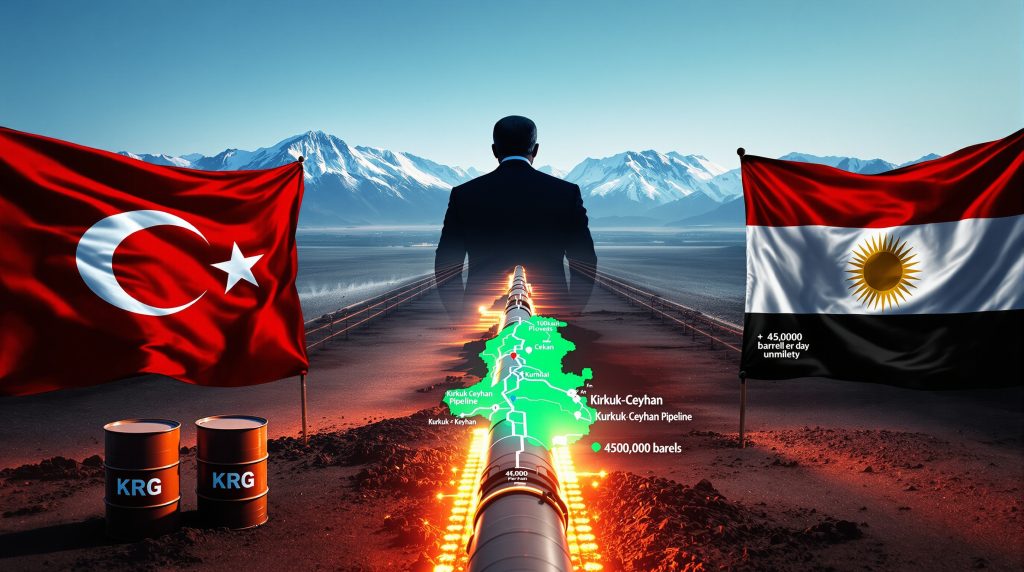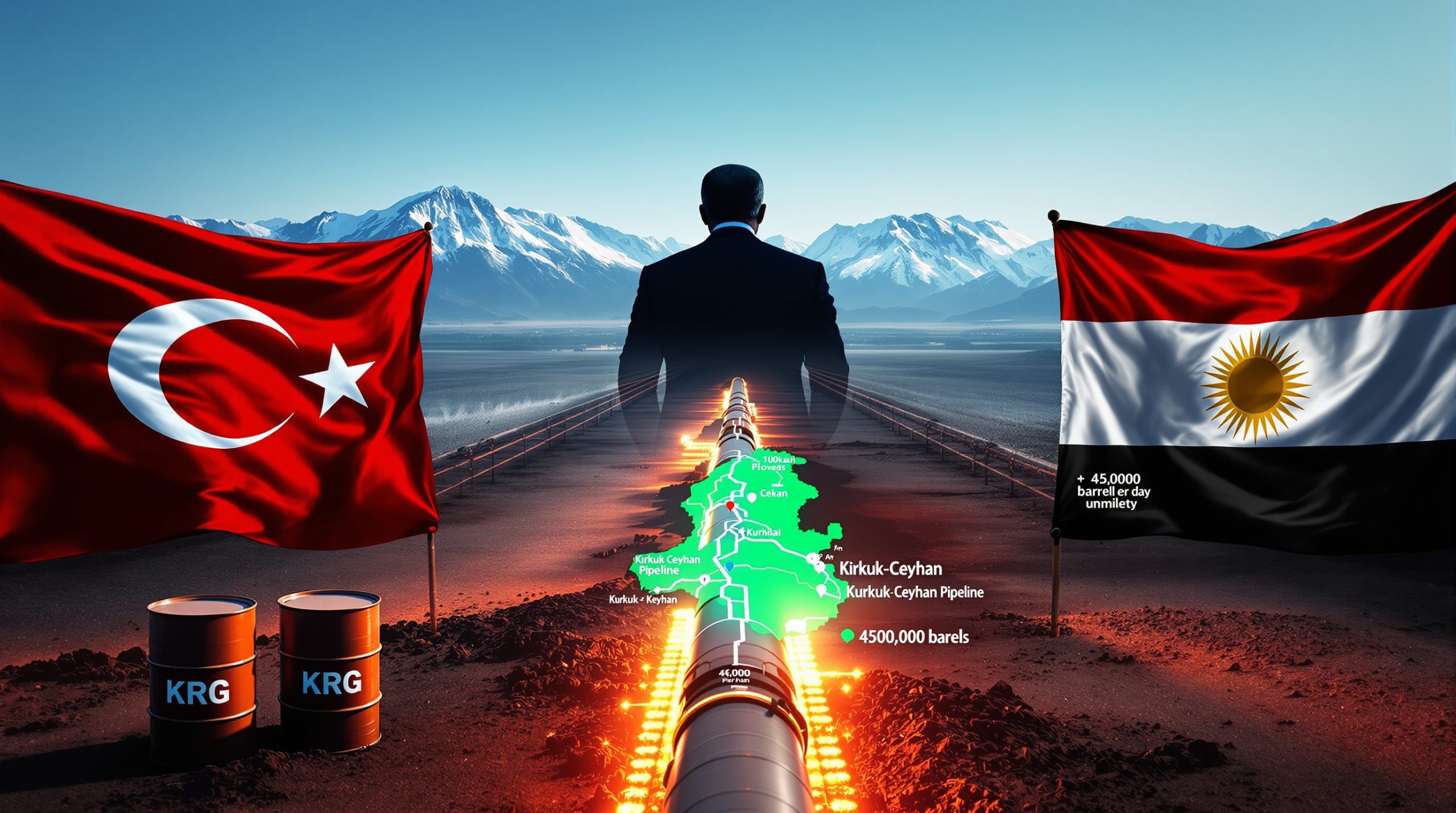Why Is Turkey Blocking Kurdistan Regional Government Oil Exports?
The ongoing blockade of oil exports from the Kurdistan Region of Iraq (KRI) through Turkey has created significant economic challenges for the semi-autonomous Kurdish region. While recent reports suggest potential progress toward resuming exports, the underlying geopolitical dynamics reveal a more complex situation than initially apparent. Turkey's continued restriction of Kurdish oil flows stems from deep-seated strategic concerns rather than merely technical or legal disputes.
The Current State of the Kurdistan-Turkey Oil Impasse
The Kirkuk-Ceyhan pipeline (also known as the Iraq-Turkey Pipeline or ITP) has been shut down since March 25, 2023, halting approximately 450,000 barrels per day (bpd) of Iraqi oil exports, including around 370,000 bpd of Kurdish crude. This shutdown followed an International Chamber of Commerce (ICC) ruling that ordered Turkey to pay approximately $1.5 billion in damages to the Federal Government of Iraq (FGI) for unauthorized exports between 2014 and 2018.
Recent discussions between the Kurdistan Regional Government (KRG) and Baghdad reportedly produced a tentative agreement where 50,000 bpd would be reserved for domestic use within Kurdistan, with the remainder delivered to Iraq's State Oil Marketing Organization (SOMO) for export. However, this arrangement faces a significant obstacle: Turkey has not agreed to it.
How Did the Legal Dispute Lead to the Pipeline Shutdown?
The pipeline closure stems from a legal battle that began in 2014 when Baghdad filed for ICC arbitration against Turkey, alleging unauthorized facilitation of Kurdish oil exports without federal consent.
Key Legal Developments:
- The ICC ruled that Baghdad should exercise control over crude oil exports at Ceyhan
- Turkey was ordered to pay 50% of the discount at which Kurdistan had sold oil
- The original claim by Baghdad was $33 billion, later reduced to $1.5 billion
- The ruling effectively terminated the 52-year-old agreement governing the pipeline
This legal framework is crucial because the resolution must occur between Turkey and the Federal Government of Iraq—the KRG is not legally recognized as a party to these international agreements.
What Are Turkey's Strategic Concerns About Kurdish Oil Independence?
Turkey's reluctance to reopen the pipeline transcends the legal dispute and centers on fundamental geopolitical concerns about Kurdish autonomy and potential independence.
Turkey's Kurdish Population Concerns
Turkey's domestic politics heavily influence its approach to the KRI. With approximately 18% of Turkey's population being Kurdish, Ankara views Kurdish autonomy in Iraq as a potential catalyst for similar aspirations within its own borders.
The 2017 Kurdistan independence referendum, where over 90% voted in favor of independence, triggered immediate and severe responses from Turkey, including:
- Threats of military intervention in the KRI
- Warnings about cutting off Kurdistan's crude oil flow
- Statements that Turkey would deal exclusively with Baghdad regarding Kurdish oil
President Recep Tayyip Erdoğan's government fears that a financially independent KRI could evolve into a sovereign Kurdish state, potentially encouraging separatist movements within Turkey itself.
How Do Regional Powers View Kurdistan's Oil Autonomy?
The KRI's oil independence isn't just a concern for Turkey—it's viewed with suspicion by multiple regional powers.
The "Triangle" Alliance Against Kurdish Oil Autonomy
Recent high-level meetings between Baghdad, Ankara, and Tehran have reportedly resulted in a coordinated approach to limit KRG's autonomy. This alliance has agreed on several principles:
-
Supporting Baghdad's authority over issuing oil licenses, overseeing production, and distributing revenues
-
Backing Baghdad in exerting full authority over borders with Turkey and Iran
-
Ensuring newly discovered energy resources and lithium in Kurdistan will be managed through Baghdad
-
Establishing that Baghdad will determine the KRG's share of oil and natural resource revenues
This regional consensus significantly reduces the likelihood of a quick resolution favorable to Kurdish autonomy.
What Is Baghdad's Position on Kurdish Oil Exports?
The Federal Government of Iraq has consistently sought to assert control over all Iraqi oil exports, including those from Kurdistan.
Baghdad's Centralization Efforts
Iraq's current Prime Minister Mohammed Al-Sudani has emphasized that the new unified Oil Law will govern all oil and gas production and investments in both Iraq and Kurdistan, describing it as "a strong factor for Iraq's unity."
Baghdad's historical actions demonstrate this centralization strategy:
- After the 2017 Kurdish independence referendum, then-Prime Minister Haider al-Abadi:
- Declared the vote unconstitutional
- Took control of official border crossings
- Restricted international flights to Kurdish airports
- Sent troops to the disputed oil-rich region of Kirkuk
- Called on international buyers to stop purchasing crude oil directly from Kurdistan
Baghdad views the KRG as unreliable in adhering to previous budget-for-oil agreements, further diminishing its interest in maintaining Kurdistan's oil export autonomy.
Why Is the "Full Usage" Demand a Strategic Obstacle?
Turkey has stated that any new agreement replacing the terminated 52-year-old arrangement should be for "full usage" of the Iraq-Turkey Pipeline—a requirement that appears designed to be unworkable.
The Impossible Pipeline Capacity Demand
Turkey's insistence on "full usage" would require:
- Approximately 1.5 million bpd flowing through the pipeline to Turkey
- This contrasts with Iraq's current export reality, where around 80% of its total 3.5 million bpd production flows in the opposite direction to Asian markets
This demand creates an impossible condition for resuming exports, suggesting Turkey is using technical requirements as a pretext for maintaining the blockade while pursuing broader strategic objectives.
How Has Iran Influenced the Kurdistan Oil Situation?
Iran, with its own Kurdish population (approximately 15% of its total), shares Turkey's concerns about Kurdish independence and has played a significant role in the regional approach to Kurdistan.
Iran's Strategic Interests
Tehran reportedly views the KRG with suspicion, considering it a "de facto puppet of Washington" that has gathered intelligence on Iranian-linked paramilitary groups. This perception has led Iran to:
- Call for neighboring countries to block land borders with Iraqi Kurdistan after the 2017 referendum
- Support Baghdad's centralization efforts
- Participate in the regional alliance with Turkey and Iraq to limit Kurdish autonomy
Iran's involvement adds another layer of complexity to any potential resolution of the export impasse.
What Are the Economic Implications of the Continued Blockade?
The ongoing export blockade has created severe economic challenges for the Kurdistan Region of Iraq.
Financial Impact on Kurdistan
Without oil export revenues, the KRG faces:
- Reduced ability to pay public sector salaries
- Limited funds for infrastructure development
- Decreased foreign investment in the energy sector
- Increased economic dependence on Baghdad
Several international oil companies operating in Kurdistan have faced financial difficulties due to the export disruption, with some considering scaling back operations or exiting the region entirely. Furthermore, the ongoing situation has highlighted significant energy export challenges that affect not only Kurdistan but resource-dependent economies worldwide.
Is There a Path Forward for Kurdistan Oil Exports?
Despite the challenging geopolitical landscape, there are potential scenarios that could lead to a resumption of exports.
Possible Resolution Scenarios
-
Baghdad-Ankara Agreement: A direct deal between Turkey and Iraq that provides sufficient guarantees regarding Kurdish autonomy while addressing Turkey's security concerns
-
International Mediation: Involvement of international powers with influence in the region to broker a compromise solution
-
Economic Necessity: Severe economic pressure on all parties could eventually force pragmatic concessions
-
Limited Export Resumption: A phased approach starting with smaller export volumes under strict Baghdad oversight
However, any resolution would likely require significant concessions from the KRG regarding its autonomy in the oil sector. Global oil price movements could also influence the urgency with which parties seek resolution.
What Does This Mean for Regional Energy Security?
The Kurdistan oil export blockade has implications beyond the immediate parties involved, affecting regional and global energy markets.
Broader Energy Security Implications
-
Market Impact: The removal of approximately 450,000 bpd from global markets has contributed to tighter supply conditions, adding to existing US oil production concerns
-
Investment Climate: The dispute has damaged investor confidence in Kurdistan's energy sector, potentially limiting future development
-
Regional Integration: The blockade has hindered efforts to increase regional energy cooperation and infrastructure development
-
Alternative Export Routes: The situation has prompted exploration of alternative export routes, though none currently match the capacity and efficiency of the Kirkuk-Ceyhan pipeline
The situation also highlights the complex relationship between tariffs and oil markets in geopolitically sensitive regions.
Conclusion: The Geopolitical Reality Behind the Oil Blockade
The continued blockade of Kurdistan oil exports through Turkey reflects deep-seated geopolitical concerns rather than merely technical or legal disputes. Turkey's actions, supported by regional powers, aim to limit Kurdish autonomy and prevent any path toward independence.
While economic pressures might eventually force compromises, any resolution will likely strengthen Baghdad's control over Kurdish oil resources rather than enhance the KRG's autonomy. The fundamental concerns about Kurdish independence that triggered the initial response to the 2017 referendum remain unchanged, suggesting that Turkey's blockade serves strategic objectives that transcend the immediate oil export issue.
For the Kurdistan Region, the path to resuming oil exports appears to run through greater integration with and subordination to Baghdad's federal authority—an outcome that aligns with the strategic interests of Turkey, Iran, and the Federal Government of Iraq. Analysts continue to monitor the situation closely, with some providing detailed oil price crash analysis related to these geopolitical tensions.
FAQ: Kurdistan-Turkey Oil Export Dispute
Why did Turkey initially allow Kurdistan to export oil independently?
Turkey initially permitted Kurdistan's independent oil exports primarily for economic benefits and energy security, while maintaining leverage over both Baghdad and Erbil. This arrangement allowed Turkey to access discounted oil while positioning itself as an essential transit route for Iraqi energy.
Could Kurdistan develop alternative export routes?
Kurdistan faces significant geographical and political constraints in developing viable alternative export routes. Potential options through Iran, Syria, or directly to the Mediterranean all present major political, security, and infrastructure challenges that make them impractical in the near term.
How has the U.S. position on Kurdistan oil exports evolved?
The U.S. has historically maintained a delicate balance—supporting Kurdish autonomy while recognizing Baghdad's sovereignty. Under recent administrations, Washington has encouraged Baghdad-Erbil cooperation on energy issues while avoiding direct involvement in the legal dispute between Turkey and Iraq.
What impact has the export blockade had on international oil companies in Kurdistan?
The export blockade has severely impacted international oil companies operating in Kurdistan, leading to payment delays, production cutbacks, and reconsideration of investment plans. Several companies have written down assets or considered exiting the region due to the uncertain export outlook.
Could increased domestic refining capacity help Kurdistan's oil industry survive?
While Kurdistan has increased its domestic refining capacity, this represents only a partial solution. Local refineries can process only a fraction of potential production, and the domestic market cannot absorb the volume or generate the revenue that international exports would provide.
Further Exploration:
Readers interested in learning more about the geopolitical dynamics of Middle Eastern oil exports can also explore related educational content, such as Oilprice.com's article on Turkey's blockade of KRG oil exports and the Kurdistan24 report on industry calls for resuming Kurdish oil exports.
Interested in Spotting Market Opportunities from Major Mineral Discoveries?
Discovery Alert's proprietary Discovery IQ model instantly notifies investors of significant ASX mineral discoveries, transforming complex data into actionable insights for both short-term traders and long-term investors. Explore why historic discoveries can generate substantial returns by visiting the Discovery Alert discoveries page and position yourself ahead of the market.




